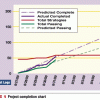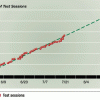 |
Perspectives from a Test Manager: Four Keys to Keeping Your Testing on Track This article highlights four keys to getting better organized: 1. A common set of ground rules on the test progress, defect reporting, and verification; 2. The ability to convey how your team’s testing is going--on a frequent basis; 3. Knowing what needs to be tested--and being able to stand behind the reasons why; 4. Maintaining good communication with the development leaders to help move the product through the development phases--being proactive rather than reactive.
|
|
 |
Session-Based Test Management: A Strategy for Structuring Exploratory Testing Unlike traditional scripted testing, exploratory testing is an ad hoc process. Everything we do is optimized to find bugs fast, so we continually adjust our plans to refocus on the most promising risk areas; we follow hunches; we minimize the time spent on documentation. That leaves us with some problems. For one thing, keeping track of each tester’s progress can be like herding snakes into a burlap bag. Every day I need to know what we tested, what we found, and what our priorities are for further testing.
|
|
|
|
The Influential Test Manager: How to Develop and Use Influence to Help Your Test Group - and Project - Succeed Test managers often feel that while somebody might be in control of schedules or resources, they certainly are not. An experienced test manager shares ways to develop and use professional influence to help the test group.
|
|
|
|
Testing in the Dark How can you test software without knowing what it should do? Here is a step-by-step approach to overcoming undocumented requirements, including how to discover the requirements, how to define "quality" for the project, and how to create a test plan including release criteria.
|
|
Pages
Visit Our Other Communities
AgileConnection is a TechWell community.
Through conferences, training, consulting, and online resources, TechWell helps you develop and deliver great software every day.
